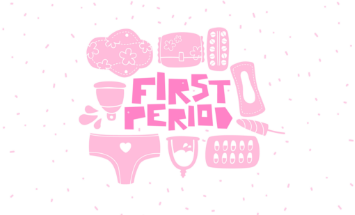Is it normal to have a heavy first period?


The first period is the highlight of puberty that is preceded by many other changes, such as breast development, growing taller, hips widening, and growth of pubic and armpit hair. Every individual is different, and each has its own pace of growth with the first period starting anywhere between the ages 9-14. While the first day of the period may see a mix of emotions, the first period for some might be very light, and a very heavy first period for some. There are instances wherein some may experience heavy periods as their first, the reasons for which we will read below.
Understanding the Menstrual Cycle
During puberty, your ovaries begin to produce eggs with the help of hormonal changes. These hormones produce tissue that has the ability to promote pregnancy inside the womb or uterus. When a pregnancy does not occur, the hormone levels diminish over time and the tissue sheds, resulting in a period. During periods, only a small amount of blood is lost. Tissue and water make up the majority of what is seen as a period. The more bleeding there is, the more painful it can be. Blood can cluster together and create clots that may sometimes be excruciatingly unpleasant to pass. In instances where the adolescent isn't ovulating regularly, the periods may be irregular for several years.
However, in case of a heavy flow period for weeks at a time, feeling lightheaded, or heavy periods for several hours, you should consult a gynaecologist. The first few periods can be dreadfully uncomfortable. Adolescents might develop anaemia or iron deficiency as a result of bleeding difficulties.
Is it Normal to Have a Heavy First Period?
The first period is often very painful and heavy. Ovulation, or the process of producing an egg, aids in the creation of a "regular" period. Many adolescents, however, do not ovulate in the beginning, resulting in excessive bleeding. Some girls may also have a bleeding problem that manifests itself when their periods begin.
First Period – What’s Normal?

‘My first period’ – what to expect? The hormone system is still getting adapted to all the changes when you are starting periods. As a result, the cycle may be inconsistent for a few years. Even with the passage of time, what constitutes "regular" differs from person to person.
However, you can expect one cycle every 28 days or so, on an average that lasts roughly for a week. Significant bleeding usually occurs only during the first several days of the period, not throughout it.
Period bleeding that can be a cause of concern is indicated by:
- Using a large stack of pads each month
- Having periods that last longer than 10 days
- Experiencing a heavy flow period
Dealing with Heavy Periods

A heavy first period can be daunting for adolescents and parents. The sheer physical pain and the emotional upheaval is enough to lose sleep over. It is important during this time to focus on healthy eating and adequate exercise, to keep the body and mind at peace and in good health.
Because an adolescent's body is undergoing so many changes, now is an excellent time imbibe good eating habits with adequate physical activity. Exercise is an effective natural treatment for unpleasant period cramps. Exercise boosts natural endorphins, which can aid with pain management that is experienced during periods.
Poor sleep habits, staying up late, eating late, and so on, are common amongst youngsters. It is critical for teenagers to receive at least eight hours of sleep per night. Sleep deprivation can lead to weight growth, poor academic performance, and other health issues. It is critical for teenagers to engage in at least 30 minutes of cardiovascular activity every day. This will improve the quality of sleep. Eating whole meals, or those that are not processed prove to be an effective choice. Teens are prone to snacking on high-carbohydrate or sugar-laden items, so it's vital to include protein-rich foods in their meals, such as simple nuts, beans and chicken.
Is it normal to have a heavy first period may be a doubt for a lot of teens! However, if certain home remedies and over the counter medications do not give enough relief, see a doctor for further advise.





